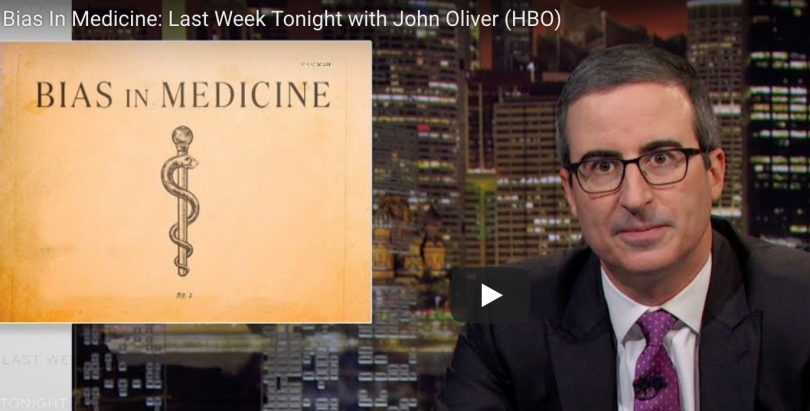Most Americans respect doctors. Still, racism and sexism in medicine is not uncommon. John Oliver explores this topic in Last Week Tonight.
Biases in medicine, as in every profession, abound. In medicine, however, biases, can have a tremendous impact on health outcomes. Oliver reports that women and people of color often have a very different relationship to our health care system than white men. “People have biases, and doctors are people. And they may have come up in a system that intentionally, or not, has often discounted the experiences of a major portion of the population.”
Sexism in medicine is real. Women have challenges getting needed health care. One study shows that if you are a woman, you are less likely to get a referral for a knee replacement. Another study shows that women over 50 who are critically ill are less likely to receive life-saving interventions than men. Still another shows that women who go to the ER with terrible stomach pain are less likely to receive pain medicine than men. A woman’s pain may be dismissed as emotional imbalance.
Some doctors do not appreciate that women may experience different symptoms from men for a particular condition. For example, women’s heart attack symptoms are different from men’s. Because some doctors are unaware, women who come to the hospital with heart attack symptoms are far more likely to be misdiagnosed than men. One study found they were seven times more likely to be misdiagnosed than men.
At the systemic level, doctors literally may know less about women’s bodies than they do about men’s bodies. Women’s bodies have not been studied as extensively as men’s; for decades women could not participate in research trials. Instead, researchers simply assumed that women’s bodies were fundamentally the same as men’s bodies, notwithstanding hormonal differences.
Racism in medicine is also severe. Just look at life expectancy differences between black men and white men. By one estimate, because of racial disparities in health care, there are 83,570 unnecessary deaths of black men each year.
There is tremendous misinformation about African Americans when it comes to health care. Oliver reports that studies show that some doctors believe there are biological differences between African Americans and white Americans, including with regard to skin, blood, and nerve endings. One in four doctor residents think black people have thicker skin than white people.
Many studies show that black Americans have less chance of getting the care they need than white Americans for hip fractures, prostate cancer and pneumonia, among other conditions. One study showed that blacks were 34 percent less likely to be prescribed opioids for pain than whites.
Racism and sexism in medicine contribute to poor health outcomes. Also, poor treatment of women and people of color can lead women and people of color to forsake needed treatment.
Oliver recommends that doctors and medical students should get bias training. We also need more diversity in the medical field. Patients need to advocate for themselves. How? Wanda Sykes, a guest on Oliver’s show, suggests that you bring a white man to the hospital or doctor’s office with you. And, ask the white man to repeat everything you say. That just might get your voice heard!
Here’s more from Just Care:
- Why you might want a female doctor
- Six reasons you need a primary care doctor in this age of specialization
- Four questions to ask yourself about your primary care doctor
- 2019 Medicare Handbook is misleading
- Four things to think about when choosing between traditional Medicare and Medicare Advantage plans











As a woman I’ve had a lot better luck with women doctors. Yes, I’ve had some good male doctors but they tend not to listen and never, never ask about my lifestyle before prescribing complicated medicines or suggesting medical solutions that simply don’t work for me. I now take a printed list of my concerns and complaints when I visit any doctor. I’ve even taken body diagrams to show my doctors where it hurts.